Pope Francis


A German Catholic diocese wants to take episcopal responsibility to a new level by making its disgraced former “bishop of bling” responsible for the 3.9 million euros ($4.9 million) in losses incurred during the luxury makeover of his residence and office.
Bishop Franz-Peter Tebartz-van Elst earned the “bling” label in 2013 when aides revealed he had spent 31 million euros ($34 million) — over six times the original estimate — on the stately complex opposite the Romanesque cathedral in Limburg, north of Frankfurt.
The Vatican banished him from the diocese several months later and, subsequently, quietly reassigned him to a low-profile post in the Roman Curia. He seemed to be going the way of other failed bishops, such as the few punished in the clerical sexual abuse scandals by being removed from their dioceses
1. Pope Francis Is Making Americans Uncomfortable — Why That’s a Good Thing
According to Gallup, Pope Francis’ favorability ratings have dropped from 76 percent in 2014 to 45 percent in 2015. America magazine writer Kerry Weber explains the pontiff’s recent dips in the U.S. polls.
2. Why Kylie Jenner Gets to Be ‘Just a Kid,’ But Amandla Stenberg Does Not
"America loves to defend those it perceives to be the most vulnerable — i.e. young white girls — at the expense of and detriment to young girls of color. … Though some may say this is just a pointless Instagram beef between children, this mentality of putting white womanhood on a pedestal has violent, real-world ramifications."
3. NASA Finds ‘Earth’s Bigger, Older Cousin’
Wait … what, now? According to NASA, its Kepler spacecraft has identified a planet some 1,400 light-years away — the first "nearly Earth-size planet to be found in a habitable zone of a start similar to our own," according to CNN.

Growing conservative disaffection with Pope Francis appears to be taking a toll on his once teflon-grade popularity in the U.S., with a new Gallup poll showing the pontiff’s favorability rating among all Americans dropping to 59 percent from a 76 percent peak early last year.
Among conservatives the dropoff has been especially sharp: just 45 percent view Francis favorably today as opposed to 72 percent a year ago.
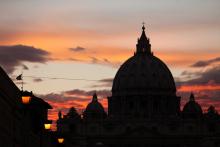
On July 21 and 22, the Vatican hosts two conferences on human trafficking and climate change, bringing the mayors of major cities — including several in the U.S. — to Rome for the events. What do human trafficking and climate change have to do with each other? And what does Catholicism have to do with them? Let us explain.
Q: Why is the Vatican concerned with human trafficking and climate change?
A: If Pope Francis has two pet issues, they are human trafficking and climate change. Since the first year of his papacy he has spoken against human trafficking, calling it “a crime against humanity” and lamenting it as modern slavery. It’s an even bet that when the pope addresses the United Nations in late September he will hammer it as one of the crucial issues of our time. Ditto on climate change. In June, the pontiff published his encyclical — the highest teaching of the church — on climate change.
“Our home is being ruined and that hurts everyone, especially the poorest among us,” Francis said just before the publication of the encyclical.
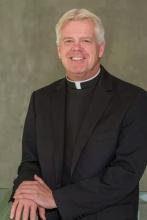
In May, the Rev. Warren Hall was abruptly dismissed from his position as the popular campus chaplain at Seton Hall University in New Jersey because the Catholic archbishop of Newark said his advocacy against anti-gay bullying, and his identity as a gay man, undermined church teaching.
Now Hall has written to Pope Francis asking that when the pontiff visits the U.S. in September, he speak out against such actions because they are “alienating” gay Catholics and the many others who support them.
In the letter, which was dated July 14, Hall asked Francis to “find time to listen to the challenges faced by LGBT people, especially those who are Catholic and wish to remain a part of the Church they have grown up in, which they love, and yet which it seems is alienating them more and more.”

AS THE FATE of the world hangs in the balance, one humble pastor—leader of the world’s smallest nation-state—offers a word. Well, closer to 40,000 words.
Pope Francis’ much awaited social teaching on ecology was released in June to global acclaim and thunderous Twitterapplause. Laudato Si’ (“Praised Be to You”) takes its name from a line in St. Francis of Assisi’s “The Canticle of the Creatures,” written in 1225. The encyclical lays out the house rules for this earthly commons we share—archaea, bacteria, and eukaryota alike. (Google it. You, me, all the fauna and flora, are part of eukaryota.) So, what do you need to know?
1. The news is not good. The world’s leading spiritual physician has diagnosed “every person living on this planet” with a progressive and degenerative disease. A soul sickness has spread through us to infect the soil, seas, skies, and even the seasons. Among humans, the poorest have the least resistance and the richest are the major vectors. This disease multiplies in isolation and loneliness, with symptoms of obsessive consumption, greed and corruption, and habitual narcissism. “The external deserts in the world are growing, because the internal deserts have become so vast.”
2. This disease is having dire consequences: objectification of the other, a failure of awe in the presence of beauty, and a defiance of reality by those who claim the “invisible forces of the market will regulate the economy” and dismiss the impact on society and nature as “collateral damage.”
1. Read the First Chapter of Harper Lee’s ‘To Kill a Mockingbird’ Sequel
Happy Christmas in July! Read this excerpt of the much-anticipated Go Set a Watchman — due to be released on Tuesday. Or listen to the chapter, featuring narration by Reese Witherspoon, over at The Guardian.
2. Pope Apologizes for Catholic Church’s ‘Offenses’ Against Indigenous People
"I humbly ask forgiveness, not only for the offenses of the church herself, but also for crimes committed against the native peoples during the so-called conquest of America."
3. When Algorithms Discriminate
So there’s this, from the Upshot: "Research from the University of Washington found that a Google Images search for ‘C.E.O.’ produced 11 percent women, even though 27 percent of United States chief executives are women. (On a recent search, the first picture of a woman to appear, on the second page, was the C.E.O. Barbie doll.)"
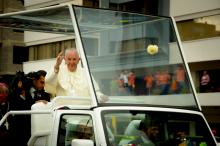
Pope Francis correctly points out that while “we are not yet tearing one another apart … we are tearing apart our common home," and that not defending our common home “is a grave sin."
The scientific community, Pope Francis believes, “realizes what the poor have long told us: Harm, perhaps irreversible harm, is being done to the ecosystem," Through human-made decisions that resulted in pollution and exploitation, Pope Francis declared, "The earth, entire peoples and individual persons are being brutally punished."
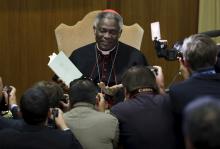
The Vatican is calling on bishops globally to act on the pope’s groundbreaking environmental encyclical, Cardinal Peter Turkson said in an interview.
Last week, bishops’ conferences across the world were sent a message urging them to speak up about the message of the papal letter, which called for greater action on the environment, said Turkson, who is president of the Vatican’s Pontifical Council for Justice and Peace.
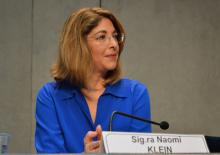
Anti-capitalism activist Naomi Klein on July 1 praised Pope Francis for standing up to Republicans who are warring against environmentalists, as the Vatican continues its battle against climate change with a high-level conference at the Holy See.
“I do believe that given the attacks that are coming from the Republican Party and fossil fuel interests in the U.S. it was a particularly courageous decision to invite me here,” Klein, who lives in Canada, told journalists at the Vatican.

Everyone is excited about Pope Francis making his first visit to the United States in September. For American Catholics, it’s a rare opportunity for us to see our beloved Holy Father on our home turf. We want to do something special to welcome Pope Francis to the United States — so we created Flat Francis.
We’re encouraging Catholics to download the Flat Francis cutout from our website and take a photo with him that represents their experience of the Catholic Church in America. It can be a selfie, a photo of Flat Francis in their Church, or anything else that showcases the many people, places, and activities of American Catholicism. The photos can be posted on Twitter or Instagram with the hashtag #FlatFrancis or e-mailed to socialmedia@catholicextension.org. We will use the photos to assemble a photomosaic that we will send to Pope Francis in September.

The Vatican on June 30 released details of Pope Francis’ itinerary for his Sept. 22-27 U.S. visit, his first, and it shows how this “pope of the people” wants to avoid becoming a prisoner of the East Coast “power corridor” during his five days in Washington, New York, and Philadelphia.
For example, organizers have added visits to a Catholic Charities food program in downtown Washington, a Catholic school in Harlem that serves largely Latino immigrant children, and a prison in Philadelphia to meet with inmates and some of their families.
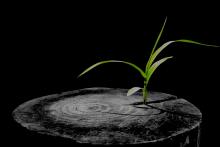
“The task of cleaning up our environment calls for a total mobilization by all of us. It involves governments at every level; it requires the help of every citizen.”
Sounds like a liberal Democrat, right? Someone who has been using Pope Francis’s recent climate encyclical Laudato Si’ (“Blessed Be”) as a political bludgeon, wielded against “climate change deniers?” Nancy Pelosi, perhaps? Not quite.
With these words, President Richard Nixon concluded his plea to congress in 1970 to take action on behalf of the environment, stressing that this was “an urgent common goal of all Americans.” Nixon then gathered bipartisan support as he spearheaded the creation of the Environmental Protection Agency, and inked 14 laws related to environmental protection.
To be sure, Nixon didn’t know what to make of environmentalists, once complaining that they wanted everyone to live like “a bunch of damned animals.” Still, when a 2012 poll asked 12 leading environmental groups to rank the three most environmentally-friendly presidents, Nixon came in second — behind Teddy Roosevelt, a fellow Republican.

The past 12 months of violence against unarmed black bodies continues to draw national attention to the ongoing challenge of police brutality in the United States. Under the collective action call of #blacklivesmatter, activists and concerned citizens across the country challenge the ideology of white supremacy undergirding our criminal justice system and demand an end to state violence against black bodies. Yet the #blacklivesmatter movement is about more than an end to police brutality; it is call for the health, wholeness, and vitality of all black communities and a world in which black lives are no longer systemically and intentional targeted for demise. This includes an account of the physical environment in which black communities reside.

Pope Francis writes, “All of us can cooperate as instruments of God for the care of creation, each according to his or her own culture, experience, involvements, and talents.” And it is the combination of our talents that can alter the path of destruction we have traveled down for far too long.
Pope Francis paints the picture of this path all too well.
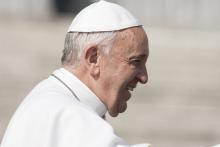
By choosing to focus on the plight of the poor and the groaning of the earth itself, Francis is tapping into something much deeper than denominational squabbles and political maneuvering. He is seeking to make an end-run around the tedious shouting matches of privileged contenders in pitched ideological battles. This is a pope, not of the pundits but of the people – and of the planet.
We’re all connected. Just as the body of Christ is one – despite all of our institutional and ideological boundaries – all of humanity, all life is one. We’re rooted together in the soil that feeds us, in the natural ecosystems that sustain our very existence.
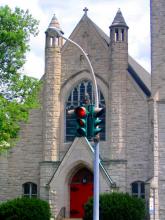
Americans have less confidence in organized religion today than ever measured before — a sign that the church could be “losing its footing as a pillar of moral leadership in the nation’s culture,” a new Gallup survey finds.
“In the ’80s the church and organized religion were the No. 1″ in Gallup’s annual look at confidence in institutions, said Lydia Saad, author of the report released Wednesday.
Confidence, she said, “is a value judgment on how the institution is perceived, a mark of the amount of respect it is due.” A slight upsurge for Catholic confidence, for example, parallels the 2013 election and immense popularity of Pope Francis.

Pope Francis is throwing the full weight of Catholic teaching, and his considerable moral standing, behind the fight against climate change in an unprecedented papal document on the environment that immediately makes the Catholic Church a major player in one of the most important and contentious debates of the next generation.
A draft version of the 192-page encyclical, which will be officially published on June 18, indicated that Francis wastes little time with climate-change deniers or his critics on the right — many of them within the church.
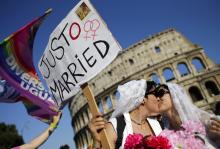
Pope Francis on June 14 stressed the importance of children having heterosexual parents, just a day after Rome’s gay pride march demonstrated the changing attitudes about same-sex couples outside the Vatican walls.
Addressing around 25,000 followers from the Diocese of Rome, the pope said the differences between men and women are fundamental and “an integral part of being human.”
The pontiff likened a long-lasting marriage to a good wine, in which a husband and wife make the most of their gender differences.

In an unprecedented move, the Vatican on June 15 announced its former ambassador to the Dominican Republic, Jozef Wesolowski, would stand trial on charges he paid for sex with children.
Wesolowski, 66, who had the title archbishop during his five-year post in Santo Domingo, the Dominican Republic capital, was recalled to the Vatican in 2013. He was later the first person to be arrested inside the Vatican on child abuse charges.
He also faces charges of possessing child pornography during his stay at the Holy See and ahead of his arrest in September 2014, the Vatican said in a statement.